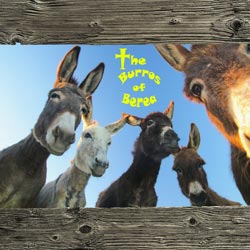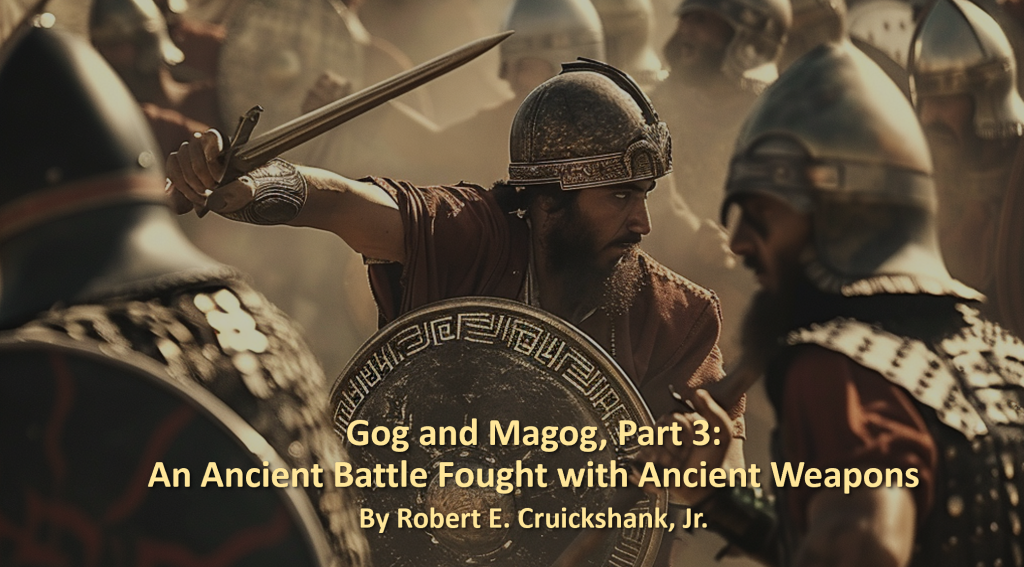Gog and Magog, Part 3: An Ancient Battle with Ancient Weapons
Copyright © Robert E. Cruickshank, Jr. (February 18, 2024)
“And I will turn you about and put hooks into your jaws, and I will bring you out, and all your army, horses and horsemen, all of them clothed in full armor, a great host, all of them with buckler and shield, wielding swords” (Ezekiel 38:4).
In the previous articles, it was observed that Haman the Agagite, from the book of Esther, is the prime candidate in identifying Ezekiel’s Gog of the Land of Magog.[1] The fact that Haman was the chief prince of the nations under the Persian Empire only serves to reinforce this connection.[2] These observations point us to the distant past, rather than the near future, to find the prophecy’s fulfillment. As we look to verse 4, the description of the weaponry used in the Gog & Magog Battle continues to pull us in the direction of past fulfillment for Ezekiel’s prophecy.
Ezekiel describes Gog’s army using the following terms: “horses and horsemen, and all of them splendidly attired, a great company with buckler and shield, and all of them wielding swords” (Ezekiel 38:4b). And we can add to this the “bows and arrows” and “war clubs and spears” of Ezekiel 39:9. These are the means and methods of their warfare. As Gary DeMar points out, Ezekiel is describing “an ancient battle fought with ancient weapons.”[3] As such, this perfectly fits the battle that was fought at the time of Esther:
“The Jews struck all their enemies with the sword, killing and destroying them, and did as they pleased to those who hated them” (Esther 9:5).
The irony here is that the Dispensationalists, who normally push for a hermeneutic of extreme literalism, can see nothing but modern warfare and modern weapons in this passage.
For example, Jack Kelley, of Grace Thru Faith Ministries, informs us:
“Ezekiel didn’t actually say the attackers would be on horseback. That’s just the way early English translators interpreted the Hebrew. The Hebrews word used in Ezekiel 38:4 would be something like leaper in English and often referred to a bird. But in the 1600’s soldiers didn’t fly around on birds, they rode horses. In short, there’s really no requirement for the soldiers to be on horseback. They could be in helicopters and planes. Neither will they necessarily be using bows and arrows, as Ezekiel 39:3 indicates. Today these words might be translated as launchers and missiles.”[4]
The problem with Kelly’s approach is that Miriam used the exact same words when she sang, “the horse and rider have been thrown into the sea” (Exod. 15:19-21). Did she really mean that Pharaoh and his armies were flying around in helicopters and planes, equipped with rocket launchers and missiles, and took a nose-dive straight into the ocean?
Another example would be Tim LaHaye, who warned about a supposed Russian plot to invade Israel. LaHaye claimed that 70,000 assault weapons were uncovered in a hidden, Russian underground bunker. “The question arises,” said LaHaye, “was Russia planning to use this weaponry for the invasion of Israel prophesied in Ezekiel 38–39?”[5] Unless the Russians were stockpiling swords and spears, bows and arrows and war clubs (Ezek. 38:4, 39:3,9), the answer would be, no, this would not have fulfilled Ezekiel 38-39.
David Jeremiah informs us that “We must allow common sense to prevail in our reading of Ezekiel. He spoke of the future using terms and descriptions that he and the people of his day would understand. If he had written of tanks and missiles and bombs, those living in his time would have been utterly mystified, and his message would have had no meaning to them.”[6]
The irony here is that these are the same people who claim that the word “Rosh” really means modern-day “Russia” and would have been utterly meaningless to Ezekiel’s original audience.[7] So, it’s OK for some things in the prophecy to be utterly meaningless to Ezekiel’s original audience but not others?
Sensing the problem here, Andy Woods suggests: “By the time these events happen—due to the peculiar circumstances of the day, such as depletion of the world’s energy supply and disarmament agreements—there actually will be a return to ancient warfare practices. Thus, people will invade on horses and use ancient weaponry…Ezekiel’s description of ancient weaponry,” says Woods, “is an insufficient argument to justify pushing this whole prophecy back into the ancient past.”[8]
But this creates more problems than it solves for the Dispensationalist. How is the Antichrist supposed to implement the Mark of the Beast, through advanced technology, if all this technology becomes inoperable and obsolete? The futurist wants it both ways. It’s literal when they need it to be literal, it’s symbolic when they need it to be symbolic. It’s modern technology when they need it to be modern technology, it’s archaic technology when they need it to be archaic technology. And it all completely ignores the context and setting in which Ezekiel’s prophecy was written and makes it completely irrelevant to his original audience.
The truth is that the Dispensationalists’ literal hermeneutic is merely a hermeneutic of convenience. A truly Biblical hermeneutic focuses on the historical context and the original audience. A truly Biblical hermeneutic does not seek to manipulate the text to fit a preconceived narrative. A truly Biblical hermeneutic follows the axiom that Scripture interprets Scripture. This being so, the ancient battle that Ezekiel describes comports with the ancient battle that was fought in Esther. And the main antagonist in both books is the same person – the chief prince of the Persian nations in Esther’s world. In our next installment, we’ll take a look at those very nations, listed in Ezekiel 38:5-7, as the trend of prophecy in Ezekiel and fulfillment in Esther continues.
____________________________________________________
[1] https://burrosofberea.com/gog-and-magog-part-1-from-saul-and-agag-to-mordecai-and-haman/
[2] https://burrosofberea.com/gog-and-magog-part-2-the-chief-prince-of-meshech-and-tubal/
[3] Gary DeMar, The Gog and Magog End-Time Alliance (Powder Springs, GA: American Vision Press, 2016), p.198.
[4] https://gracethrufaith.com/ask-a-bible-teacher/soldiers-on-horseback/
[5] The Coming Peace in the Middle East, p. 55
[6] David Jeremiah, What in the World is Going On? 10 prophetic Clues You Cannot Afford to Ignore (Nashville, TN: Thomas Nelson, 2008), 182–183.
[7] https://davidjeremiah.blog/what-does-the-bible-say-about-modern-russia/ Edwin Yamauchi writes, countering this type of reasoning: “The Hebrew word rosh can have nothing to do with modern ‘Russia.’ This would be a gross anachronism, for the modern name is based upon the name Rus, which was brought into the region of Kiev, north of the Black Sea, by the Vikings only in the Middle Ages (Edwin M. Yamauchi, Foes from the Northern Frontier: Invading Hordes from the Russian Steppes [Grand Rapids, MI: Baker Book House, 1982], p. 20).
[8] Woods, Andy. The Middle East Meltdown: The Coming Islamic Invasion of Israel (pp. 29-30). Dispensational Publishing House. Kindle Edition.


